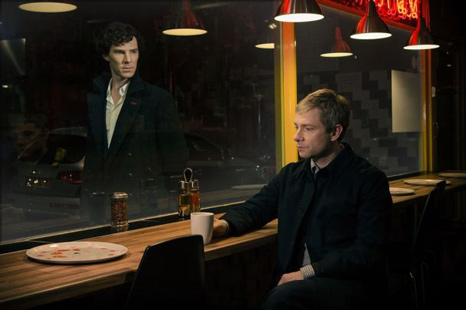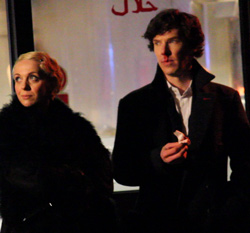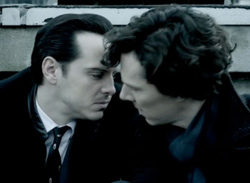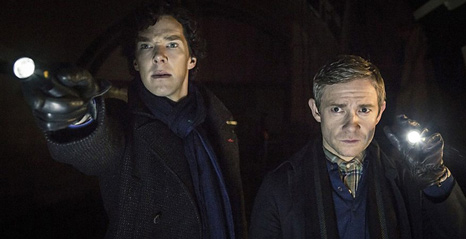
Of course, all this happened in the year 1903. Sherlock Holmes, a man for whom Sir Arthur Conan Doyle cherished about as much affection as he did for the clogged hair that accumulates in even the cleanest household drains, brought his world-famous detective back from the grave that year with the publication of “The Adventure of the Empty House.” Previously, Doyle had waffled about with The Hound of the Baskervilles, claiming cattishly that Holmes wasn’t undead, he was merely starring in an earlier case, one which happened before that unfortunate incident in which a maths professor weighing about a buck twenty soaking wet nudged a martial artist and amateur boxing champion off a cliffside in Switzerland.
Fast forward to New Year’s Day 2014, and Benedict Cumberbatch’s Sherlock from the BBC series of the same name comes waltzing back into London following a hiatus of two long years. Is the episode absolutely everything we ever wanted in the history of television?
No.
Was it ever going to be?
Heeeeeeeeell no.
But it’s truly beautiful in many ways, so let’s chat about it.
Mark Gatiss, the screenwriter for the episode and the almost impossibly smug Mycroft Holmes, knows what he is doing when it comes to tropes. Sherlock Holmes has been dismantling Jim Moriarty’s network in faraway lands, and the episode—after a wonderfully ridiculous explanation of how Sherlock survived the fall that turns out to be a theory hatched by disgraced and guilt-ridden Scotland Yarder Anderson that fooled half a million people into switching the channel five minutes in—begins with Sherlock on the run. He is captured and tormented, strung up with bare arms wide in a truly deft impersonation of a homeless Jesus Christ, and rescued by his brother Mycroft. (Smugly, of course.) We are clearly dealing with deep themes from the get-go, and the story of how Sherlock re-integrates himself back into his life following his escape prove far more important than any nagging considerations of plot or mystery.

The remainder of the episode is devoted largely to Sherlock’s perspective as he seeks out his comrades, makes his amends, and tries to get his blogger back. New director Jeremy Lovering employs a style very fitted to Sherlock’s mercurial mind, cutting from shot to shot with an abruptness that is so modern it is almost sleek despite being chaotic. The action scenes, most memorably an intense motorcycle race to save John that allows Sherlock and Mary to perform all sorts of derring-do in the beautifully shot London streets, are dynamic in the extreme. He is given myriad scenes of sincere character development to work with—Sherlock thanking Molly Hooper for her help in saving him, Sherlock reunited with his parents (played by Cumberbatch’s actual family, Wanda Ventham and Timothy Carlton)—and the pacing and poignancy of all such moments are lovingly executed.
There are problems with the script, however, and not necessarily the ones that the Sherlock fandom at large are up in arms about. Regarding the latter, Gatiss, who is well aware of the thriving community of happy misfits like myself who have carried the Sherlock torch for two years, has performed what many have suggested was over-the-top fanservice in “The Empty Hearse.” Anderson the conspiracy theorist stands in for the fandom, insisting “I believe in Sherlock Holmes” exactly according to viral internet meme.  In one fannish conspiracy theory, Sherlock kisses Molly Hooper—in another, he very nearly kisses Andrew Scott’s wickedly delightful Jim Moriarty. All this might be witty nonsense, but I argue that it is also very loving nonsense. And for every Sherlock fan who decries the complete annihilation of the fourth wall, there are twenty Sherlock fans who have tweeted the production team, sent pictures of their cosplays, spray painted I BELIEVE IN SHERLOCK HOLMES on the walls of their dormitories, and tattooed 221B’s iconic sitting room wallpaper on their foreheads. You, the fan, may not have asked for this much attention—but we, the fandom, did as a whole. As Sherlock says to John during the fraught climax of the terrorist case he’s investigating, be careful what you wish for.
In one fannish conspiracy theory, Sherlock kisses Molly Hooper—in another, he very nearly kisses Andrew Scott’s wickedly delightful Jim Moriarty. All this might be witty nonsense, but I argue that it is also very loving nonsense. And for every Sherlock fan who decries the complete annihilation of the fourth wall, there are twenty Sherlock fans who have tweeted the production team, sent pictures of their cosplays, spray painted I BELIEVE IN SHERLOCK HOLMES on the walls of their dormitories, and tattooed 221B’s iconic sitting room wallpaper on their foreheads. You, the fan, may not have asked for this much attention—but we, the fandom, did as a whole. As Sherlock says to John during the fraught climax of the terrorist case he’s investigating, be careful what you wish for.
What is important to remember during all these discussions of too little disconnect and too many winks and nods is that Sherlock Holmes the character has always been 1) cognizant of his fanbase and 2) more than willing to openly mock it. When Sir Arthur Conan Doyle cleverly elected to make Holmes aware that Watson was publishing stories about him in the Strand Magazine, he threw wide the door to ribbing Sherlockians about our glorious hobby, and Holmes often chided Watson for the pulp quality of his writing and the egalitarian nature of his storytelling. As Holmes concedes sulkily following a long harangue in “The Adventure of the Copper Beeches,” “But, indeed, if you are trivial, I cannot blame you, for the days of the great cases are past. Man, or at least criminal man, has lost all enterprise and originality. As to my own little practice, it seems to be degenerating into an agency for recovering lost lead pencils and giving advice to young ladies from boarding-schools.” The young ladies from boarding-schools now have internet access, and the BBC is aware of us. There is nothing harmful in this, to my mind, and nothing mean-spirited, and as Holmes was always well aware, there is nothing new under the sun.
Where “The Empty Hearse” begins to go seriously astray is when we realize that director Jeremy Lovering has filmed a rather fabulous sequence in Sherlock’s mind palace to do with trains, and then rather more domestic scenes happen and people play Operation and snack on chips from the fried fish joint in Marylebone Road, and then someone is going to blow up Parliament, and then he is thwarted, without any actual plot developments or detection taking place whatsoever. The entire terrorist case that threatens London hinges on a man’s disappearance from a moving train where there were no tunnels—but there were tunnels, of course, and that is the solution. Voila. We said there weren’t tunnels branching off! But there were! It was a lie! And neither Sherlock Holmes nor a rabid train enthusiast were able to think of this profoundly obvious option until the very very last moment! Edge-of-your-seat television, may I introduce you to Simon Says, a game nearly on an intellectual par with your plotline.
Still worse is the fact that Colonel Sebastian Moran of “The Adventure of the Empty House” was a dynamic baddie, a sharpshooting soldier gone amuck, and he represented the final impediment to Holmes’s destruction of Professor Moriarty’s remaining network. I would comment extensively on Lord Moran of “The Empty Hearse,” who as previously mentioned wants to blow up Parliament, but I can’t, because he is given not a single line of dialogue in the entire ninety minute episode, so as to why he wants to blow up Parliament, I will have to leave that back story to the fanfiction writers. It is my belief that during an egregious sugar high brought about by too many red lollies at age six, Lord Moran was pretending to be Spiderman and practicing what would later come to be known as parkour when he stubbed his toe against Parliament, and grew ever more bitter towards the building as the years dragged on. There. Now someone go write it, and post it to tumblr, because the Sherlock producers certainly aren’t going to give you anything better to go on.
The fact that Lord Moran’s impeccable coiffure is the most developed aspect of his character is disappointing, but clearly the showrunners were far more interested in detailing the changes wrought in Sherlock Holmes following his years in exile. And make no mistake—the man has changed.

(By the way, damsels in distress proving to us all that heroes have feelings, you’ve got nothing on Sherlock’s John Watson—by this point, I’m convinced I could kidnap the man myself simply by passing him an engraved invitation reading, You are cordially invited to be chained and caged. Please render us the courtesy of an RSVP, no guests allowed with our sincere apologies, and walk into this dungeon at your earliest convenience.)
So Sherlock has changed. Where is the proof in the pudding, and how will it be presented to John Watson, a man who first tackled, then punched, then head-butted his best friend upon his return? Arguably the most important scene in the episode takes place in the explosives-ridden train car, when a tearful Sherlock on his knees begs John to forgive him because they are both about to be blown to smithereens. Of course, they aren’t blown to smithereens or even to smithers, because the show is called Sherlock and as endearing as Mrs. Hudson is, she would prove most ineffectual at solving crime. No, Sherlock turns out to have performed some sleight of hand, and just as we are convinced the end is near, Sherlock starts semi-hysterically laughing his highly improbable face off and informs John that it was all a prank, but he really did say the sweetest things, I didn’t know you cared, blah blah blah, you looked hilarious being so hardcore sincere, thank you and goodnight Vienna.
Frankly, none of the negation after the fact bothers me in the slightest. Because Sherlock Holmes has pulled this sort of puerile crap before, in the year 1910 if we go by publication (or 1897 in the Sherlockian chronology), in a marvelous case called “The Adventure of the Devil’s Foot”:
“Upon my word, Watson!” said Holmes at last with an unsteady voice, “I owe you both my thanks and an apology. It was an unjustifiable experiment even for one’s self, and doubly so for a friend. I am really very sorry.”
“You know,” I answered with some emotion, for I had never seen so much of Holmes’s heart before, “that it is my greatest joy and privilege to help you.”
He relapsed at once into the half-humorous, half-cynical vein which was his habitual attitude to those about him. “It would be superfluous to drive us mad, my dear Watson,” said he. “A candid observer would certainly declare that we were so already before we embarked upon so wild an experiment.”
We’re both cray-cray already! It was so cute that you just proclaimed your undying devotion to our friendship! Trollllollooooollloooollllooo, I can’t stop laughing, I nearly poisoned you to death and then got choked up about it! Have a fabulous day, BRB gotta get that deadly smoke out of our vacation cottage. YOLO! (Translation mine.)
In “The Empty Hearse,” the moment is diffused as surely as the bomb is diffused, and that is for many viewers an unfortunate circumstance. It is difficult to go from Martin Freeman’s absolutely devastating John Watson saying, “You were the best and wisest man I had ever known,” a line calculated to break every Sherlockian on a medieval rack, to Cumberbatch’s Sherlock merrily announcing “Killing me is so two years ago,” dropping the mic, and striding off the train.
 But it’s a factor of British television and indeed British interaction that this sort of interaction can’t be played straight and then left to warm the cockles of our hearts. And I submit that they’d never have even approached this moment if mortality hadn’t reared its ugly head, and that Sherlock’s expression when being assured of his value as a man and a hero are absolutely genuine despite the fact the situation was contrived. If you’re of another opinion, I respect that entirely. If you’re of the opinion that the BBC’s Sherlock is crueler far than the Holmes of the canon, I absolutely respect that opinion too. But re-read “The Adventure of the Dying Detective” and then get back to me.
But it’s a factor of British television and indeed British interaction that this sort of interaction can’t be played straight and then left to warm the cockles of our hearts. And I submit that they’d never have even approached this moment if mortality hadn’t reared its ugly head, and that Sherlock’s expression when being assured of his value as a man and a hero are absolutely genuine despite the fact the situation was contrived. If you’re of another opinion, I respect that entirely. If you’re of the opinion that the BBC’s Sherlock is crueler far than the Holmes of the canon, I absolutely respect that opinion too. But re-read “The Adventure of the Dying Detective” and then get back to me.
It will be very interesting to see what drama develops in subsequent episodes, not least because the newly repaired friendship between Sherlock and John is about to be subjected to a wedding and a new arch-villain in the form of Charles Augustus Magnussen (as played by Lars Mikkelsen). I will go so far as to hope that our newest antagonist will possess the uncannily effective storytelling traits of 1) motives and 2) lines of dialogue, which regrettably were not included in the Lord Moran package. But in any case, I applaud this production team for their obvious love of my favorite characters, and will wait with bated breath for Sunday, and “The Sign of Three.”
See all things Sherlock Holmes with the Sherlockiana series.
Lyndsay Faye is the author of Dust and Shadow, also The Gods of Gotham and Seven for a Secret (September, 2013) in the Timothy Wilde series from Amy Einhorn Books/Putnam. She tweets @LyndsayFaye.

Great piece. I am a huge fan of Sherlock.
Who is Molly’s fiance at the end; didn’t I see John and Sherlock pass significant looks at each other upon meeting him?
Miss Faye, thank you for the in depth and honest review of Sherlock. It’s even longer than my review of Seven for a Secret. Hope you don’t mind that I tried to crack your Sherlockian code. It’s on I Love a Mystery and a version on Amazon under Laurence Coven–Keep writing, please.